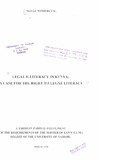| dc.description.abstract | The focus of this study is on the status of legal literacy in Kenya, both in terms of policy and in reality. The study seeks to examine government policy and the law itself with regard to popular knowledge and communication of the law. It also seeks to evaluate the effectiveness of measures, both governmental and non-governmental, that currently exist to communicate the law to the people of Kenya. Further, the study attempts to assess the actual levels of legal literacy by way of a limited field survey done in Karidudu, a poor urban area in Nairobi. Finally, the study explores the potential media through which law can be communicated to the public.
Conceptually, the discussion starts from the premise that law has an important role to play in development and is capable of being used in its liberative function to empower the poor and the .disadvantaged to improve their bargaining position in society.
An assumption made in this study is that some functional knowledge of law is essential if law is to fulfil this liberative function. A further assumption is that law is not in itself mystical. It is capable of being framed in such a manner as to be understood. It is also posited that the individual has a right to know the law and that the state has a corresponding obligation to communicate the law to the individual. An examination of government policy, as it will be evident later, reveals that legal literacy has not been a priority concern of policy makers in Kenya.
This is borne out by the lack of any definite policy on the same. It is practically evident also in the legal postulation _ which presumes knowledge of law on the part of the individual. The combination of lack of policy and of adequate measures to communicate law have resulted in the populace being largely unaware of the law and their rights. Consequently people are unaware that law can be used to further their interests in society. From this state of things it is argued that in order to alleviate the legal literacy situation in Kenya the state should first, lead the way by formulating a clear legal literacy policy and then follow it up with a vigorous programme for communication of basic law on a nation-wide scale. The implications of this call, such as the costliness of the undertaking have been reflected upon.
Chapter 1 of the study delineates the issue, that is it defines the concept of legal literacy and its significance and discusses the relevance of legal literacy in a development context. This chapter lays the conceptual foundation of the study. Chapter Two examines government policy and law regarding knowledge and communication of law. The Chapter also analyses the relevant legal provisions with a view to ascertaining if the law grants a right to know the law. Measures that currently exist to communicate the law are also examined. Chapter Three comprises a discussion of the findings of a field survey on legal literacy levels conducted in Karidudu, a slum area in Nairobi. In Chapter Four suggestions are made of possible measures that can be taken in order to communicate law. The Chapter also highlights some constraints that may arise in the endeavour to enhance legal literacy. A conclusion summarises the study. | en_US |

